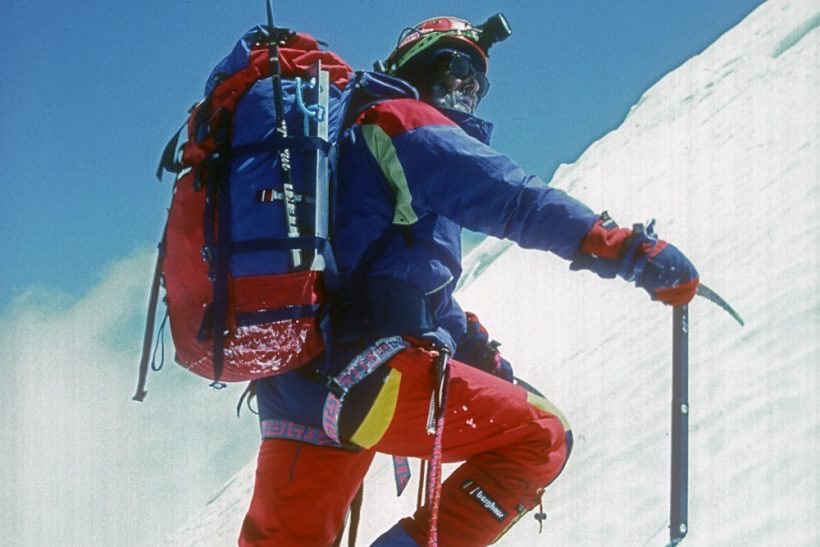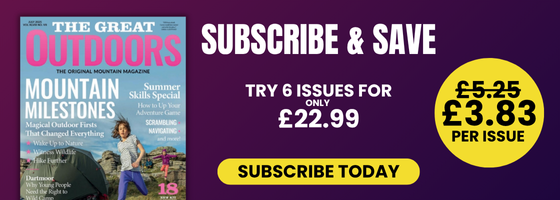Sir Chris Bonington sparked outrage last week when comments suggested rescuers did it ‘for the thrill’ – but he’s issued a statement clarifying his remarks
Sir Chris Bonington is arguably the UK’s greatest living mountaineer, with achievements to his name including the Central Pillar of Freney (first ascent, 1961), North Face of the Eiger (first British ascent, 1962), Old Man of Hoy (first ascent, 1966), Southwest Face of Everest (first ascent, 1975), and many more. He was awarded Outdoor Personality of the Year in our 2014 Reader Awards.
On 13 October, the Telegraph published a feature with the provocative headline ‘Rival mountain rescue teams are competing to get to stranded climbers, Sir Chris Bonington says’. It opened with even more provocative remarks:
“For some, they are the source of incomparable frustration, wasting emergency services’ time by attempting to climb mountains unprepared.
“But the amateur climber who finds himself in need of rescue on British peaks should not feel too guilty, Sir Chris Bonington has suggested, because volunteers enjoy the thrill.
“Sir Chris, the British mountaineer who became the oldest man to climb Everest in 1985, said mountain rescue had become almost a sport in its own right, with volunteers vying to be the most spectacular saviours.”
The climber’s remarks were recorded at the Cheltenham Literature Festival, where Bonington was promoting his new autobiography, Ascent. Here’s what he actually said:
“As far as this business of people relying on being rescued, and we see this in Britain a bit and you see it in the Alps.
“But in actual fact, there’s quite an industry actually for rescuing people. In Britain what is amazing is the mountain rescue teams are totally voluntary so they’re volunteers and they love doing it.
“Mountain rescue has almost become a sport in itself. I believe there have even been cases where there’s been a mountain rescue team from one valley and a mountain rescue team from another valley racing to get the person first. They’ve never quite got to fisticuffs but it’s got quite heated.”
Disappointing and frustrating
You can see why these comments ruffled a few feathers when taken at face value, particularly in Mountain Rescue circles. On Facebook, Patterdale Mountain Rescue made the following remarks:
“It’s both a little disappointing and frustrating when senior figures in UK mountaineering report in the press that they are “not worried about unprepared climbers needing to be rescued” Stating that “there’s quite an industry actually for rescuing people. In Britain what is amazing is the mountain rescue teams are totally voluntary so they’re volunteers and they love doing it. Mountain rescue has almost become a sport in itself. They do enjoy what they’re doing, it’s completely voluntary, they don’t have to do it.”
“Whilst the team actively encourages people to use the fells and mountains of the UK, we do our best not to criticise even when our patience is tested. We would like to encourage those venturing into the wilder parts of the UK to do so in a sensible and prepared manner.
“Patterdale and other rescue teams will always be there to help should you need us but we are at the end of the day volunteers. We all have day jobs, families and lives to lead outside of mountain rescue. We all love being part of the team but ever increasing demands on our time through fund raising, rescues and training does take it’s toll.
“This week alone I expect some members of the team will have spent well over 20hrs of their time on team business. Perhaps almost as much time in fact as those trying to publicise their new book or movie?”
Reported without their full context
However, it’s been widely speculated that something got lost in translation in the Telegraph’s article, and pressure has been mounting for Sir Chris Bonington to clarify his position. Yesterday he issued a statement on Twitter indicating that the Telegraph’s writer has taken the remarks out of context – and that inflammatory headline certainly didn’t help.
“Anyone who knows me will be in no doubt that I hold those involved in Mountain Rescue in the highest regard. The wonderful volunteers and the organisation behind them epitomise much that is to be admired and cherished in our wide and diverse outdoor community. I have stated this many times over the years and have done all that I can to help and support our local mountain rescue teams with their fundraising.
“Recently, I was taking part in an onstage interview about my new autobiography Ascent at the Cheltenham Literary Festival and when the session was opened up to questions from the floor, among many queries on many topics, I was asked my opinion of people who went into the hills ill prepared who called for help unnecessarily. I stated that Mountain Rescue was entirely voluntary and what a good job the teams do, but I also made a light-hearted comment that rescue had almost become a sport in itself and that teams from different valleys had competed to reach a casualty first. This has undoubtedly happened occasionally in the past, but most certainly hasn’t been the case in recent years when co-ordination between teams is very close.
“There are some serious issues that I think we all need to consider in an era in which more people are clearly heading into the mountains with a lack of basic skills and, sometimes, inadequate clothing and equipment. That is putting greater pressure than ever on emergency services and I do believe that institutions such as Mountain Rescue are having to seriously consider aspects of their role – and how it is sustained – in this changing world.
“While it is heartening that so many people are being inspired to explore the outdoors, we have a job to do to ensure that the less experienced are properly prepared for their time in our upland areas. The idea of the outdoors as sport is something that the wider general public can relate to, even more so now that climbing will soon make its debut at the Olympic Games. That is the context within which I made my somewhat tongue-in-cheek remarks at Cheltenham, right off the cuff, which were reported without their full context and which I do indeed regret.
“As I have always done, I will continue to voice my strong admiration for, and offer my support to, those involved in Mountain Rescue.”








